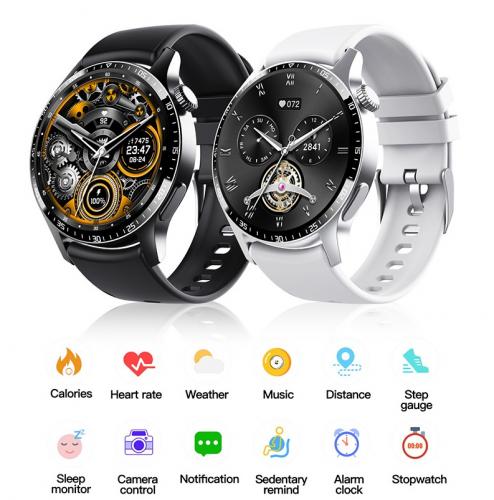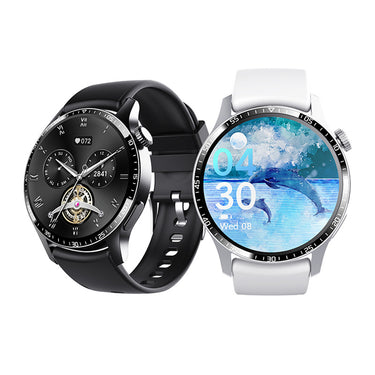Fitness Trackers with Revolutionary Health Features


This article explores the evolution of fitness trackers with innovative health functionalities designed to safeguard lives and enhance overall well-being.
In an era where health and wellness take center stage, fitness trackers have emerged as indispensable tools for monitoring physical activity and achieving fitness goals. However, recent advancements in wearable technology have transformed these devices into lifesaving companions by integrating revolutionary health features.
Continuous Heart Rate Monitoring
Traditional fitness trackers have long offered basic heart rate monitoring capabilities during exercise. However, next-generation devices now feature continuous heart rate monitoring throughout the day and night. By tracking heart rate variability and detecting irregularities, these devices provide valuable insights into cardiovascular health and can alert users to potential cardiac issues such as arrhythmias or atrial fibrillation.
Blood Oxygen Saturation Monitoring
Many modern fitness trackers are equipped with sensors capable of measuring blood oxygen saturation levels, also known as SpO2. Monitoring SpO2 levels can help identify respiratory issues such as sleep apnea, asthma, or chronic obstructive pulmonary disease (COPD). Detecting fluctuations in blood oxygen levels enables early intervention and can potentially save lives by preventing complications associated with respiratory conditions.
Fall Detection and Emergency Assistance
F207 health monitoring sports accessory feature built-in fall detection algorithms that automatically detect sudden falls or accidents. In the event of a fall, these devices can send distress signals to predefined emergency contacts or alert medical authorities with the user's location. Fall detection technology provides peace of mind for users, particularly older adults or individuals with mobility issues, by ensuring prompt assistance during emergencies.
Electrocardiogram (ECG) Monitoring
A select few fitness trackers now offer ECG functionality, allowing users to record and analyze their heart's electrical activity. ECG monitoring can detect abnormalities such as atrial fibrillation, which increases the risk of stroke and heart failure. By providing clinical-grade ECG data, these devices empower users to monitor heart health proactively and consult healthcare professionals for timely intervention and treatment.
Blood Pressure Monitoring
Innovative fitness trackers are incorporating blood pressure monitoring features, enabling users to track their blood pressure trends over time. By measuring systolic and diastolic blood pressure levels, these devices offer valuable insights into cardiovascular health and help users manage hypertension or hypotension effectively. Continuous blood pressure monitoring facilitates early detection of hypertension-related complications and supports preventive healthcare efforts.
Sleep Quality Analysis
Sleep tracking has become a standard feature in modern fitness trackers, but recent advancements focus on comprehensive sleep quality analysis. By monitoring sleep stages, duration, and disruptions, these devices provide actionable insights into sleep patterns and habits. Detecting sleep disorders such as insomnia or sleep apnea allows users to address underlying issues and improve overall sleep quality, leading to enhanced physical and mental well-being.
Integration with Health Monitoring Platforms
Fitness trackers with advanced health features often integrate seamlessly with health monitoring platforms or mobile applications. These platforms aggregate data from multiple sources, including fitness trackers, smart scales, and blood glucose monitors, to provide holistic health insights. By analyzing trends and correlations across various health metrics, users can gain a comprehensive understanding of their well-being and make informed decisions to optimize health outcomes.
Artificial Intelligence and Predictive Analytics
The integration of artificial intelligence (AI) and predictive analytics enhances the capabilities of fitness trackers to detect anomalies and predict health outcomes. Machine learning algorithms analyze user data patterns and physiological parameters to identify deviations from normal ranges and predict potential health risks. AI-driven insights empower users to take proactive measures to prevent illness, optimize lifestyle choices, and prioritize preventive care.
Remote Health Monitoring and Telemedicine Integration
Fitness trackers with advanced health features facilitate remote health monitoring and telemedicine integration, particularly in the context of chronic disease management or postoperative care. Healthcare providers can remotely monitor patients' vital signs, activity levels, and adherence to treatment plans through connected health platforms. Telemedicine capabilities enable virtual consultations, remote diagnostics, and real-time interventions, enhancing access to healthcare services and improving patient outcomes.
Hydration Monitoring
Dehydration can have serious health consequences, particularly during physical exertion or in hot climates. Some fitness trackers now offer hydration monitoring features that remind users to drink water regularly and track fluid intake throughout the day. By promoting proper hydration, these devices help prevent dehydration-related complications such as heatstroke, kidney stones, and electrolyte imbalances.
Sun Exposure Tracking
Excessive sun exposure can lead to sunburn, premature aging, and an increased risk of skin cancer. Certain fitness trackers include sun exposure tracking features that monitor UV radiation levels and provide recommendations for sun protection based on the user's location, skin type, and time spent outdoors. By raising awareness of sun safety practices, these devices help reduce the risk of sun-related skin damage and promote skin cancer prevention.
Nutritional Analysis and Food Tracking
Nutrition plays a crucial role in maintaining overall health and preventing chronic diseases. Some fitness trackers offer nutritional analysis and food tracking features that enable users to monitor their dietary intake, track macronutrients, and make informed food choices. By promoting healthy eating habits and calorie awareness, these devices support weight management, blood sugar control, and cardiovascular health.
Stress Management and Relaxation Techniques
Chronic stress can have detrimental effects on physical and mental well-being, contributing to a wide range of health problems such as hypertension, insomnia, and anxiety disorders. Advanced fitness trackers incorporate stress management features that monitor physiological stress indicators, such as heart rate variability and skin conductance. Fitness tracker with health features also offer guided relaxation techniques, breathing exercises, and mindfulness practices to help users manage stress effectively and improve resilience.
Post Your Ad Here
Comments